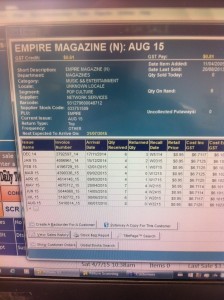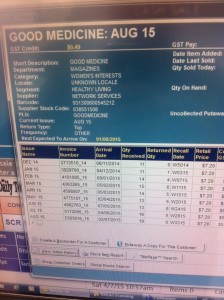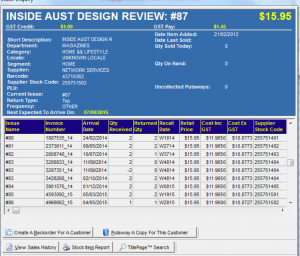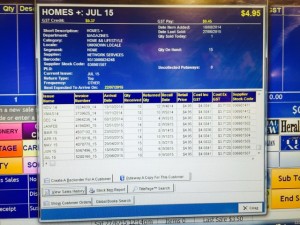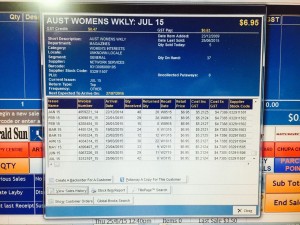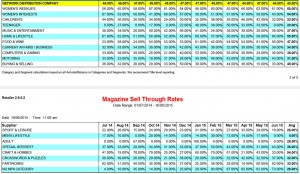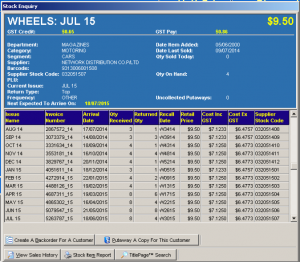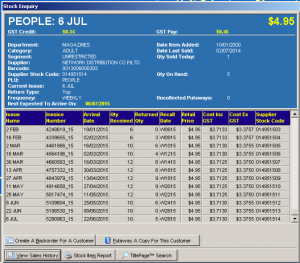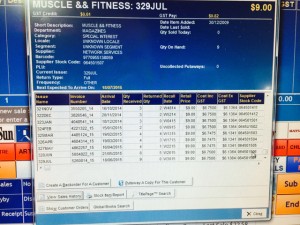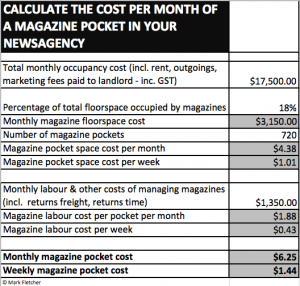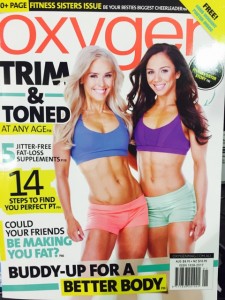I emailed the CEO of the ANF on May 31 after being shown correspondence between him and a newsagent in which he referred to me. Click here to see the text of my email.
The ANF chairman responded to me last week. Click here to see this letter
Here is my response sent yesterday to the ANF Chairman, Stuart Kilborn, on this matter of equitable magazine supply for newsagents.
Stuart,
Thank you for your June 4 letter responding to my email to ANF CEO Alf Maccioni of May 31. I emailed Alf has he has been engaged in correspondence in which he comments about me and the Australian Newsagency Blog. While I am happy to respond to your letter, I am surprised that Alf did not respond to me as he is happy to talk about me behind my back.
Also, you write to me at Tower Systems. My agitation on behalf of newsagents and my own newsagency businesses on this issue is via the newsagency blog. The blog is a non commercial activity I spend my own time on publishing my opinions on matters I think will interest newsagents.
In your letter you say:
Whilst we habitually choose to focus on positive impacts for our channel the negative effect you are potentially causing the channel through misleading information requires us to respond. If what newsagents have told me is true, in this matter of the MPA trial the ANF has not been focussing on positive impacts as it has reportedly engaged in character assassination with no regard as to the facts.
I’ll not respond at this time to much of the first two pages of your letter as what you have written does not relate to the MPA trial whatsoever.
For the record, I first became involved in discussions on magazine supply rule changes in late 2013. These discussions, including consideration on the rules at the core of the MPA trial today, predated the involvement of the ANF. My position has not changed.
I have called for newsagents to withdraw support for the ANF on the matter of the MPA trial because I think the ANF is profoundly wrong. It is unfortunate that you label my disagreement as a lack of courage. You imply that it is courageous to support the ANF and not courageous to disagree with the ANF. So much for robust debate. So much for free will. Your statement is ignorant nonsense.
I have read the MPA submission to the ACCC. In your letter you go beyond this and appear to put the position of the small number of publishers in the MPA and the two major magazine distributors – ahead of the interests of your members.
You ignore that the ACCC conference attended by the ANF, newsagents, publishers and distributors was called for by newsXpress. The ANF could have called for this conference but it did not. Given what was discussed at the conference it was worthwhile for newsagents to have had the opportunity if only to speak directly to the ACCC about the unfairness of magazine supply to our channel compared to those with which we compete.
Left to ANF representation only the conference would not have occurred and newsagents would not have had the opportunity to, for the first time, speak directly to the ACCC about the matters covered. Shame on you and the ANF for not pursuing this opportunity for subsequently denigrating some of those newsagents who did participate.
At the ACCC conference, the CEO of the ANF said the organisation has consulted with newsagents. All I can find to support this claim is a brief mention in a note from the CEO in National Newsagent magazine and a brief mention in an ANF news email. As I have written previously, on this most vital of matters, the ANF ought to have hosted capital city and regional centre forums to canvass newsagent opinions. It ought to have conducted an industry wide survey on each of the rules to be tested as documented to the ACCC by the MPA.
The ANF did not do these things.
The claim by your CEO to the ACCC conference that the ANF consulted is not supported by the evidence available. If there is other evidence of newsagent consultation please share it.
You say Consultation is a word that is loosely thrown around, and often regarded as ticking a box then proceeding down your own path. Maybe that is what consultation means within the ANF. I disagree with your definition. Consultation is a process of actively engaging with those you say you represent to fully explore and understand their views prior to you forming your own views as to how to represent their interests. The ANF has not done this on this issue.
THE NEWSAGENCY BLOG
I do not use the blog to manufacture negative factors and am offended that you claim I do.
The Newsagency Blog publishes directly through my posts and through comments by readers items that are encouraging of newsagents and those who service and engage newsagents commercially. Sure it shines a light on negative issues. This is done with facts and in an effort to change behaviour.
My take is that if I write a post that is critical of the ANF you label it as negative for the channel. I disagree with such a position. The ANF has made its own failure of representation of newsagents. The failure is exacerbated because of poor communication and a refusal for open and public discussion on matters of importance.
THE ANF CHAIRMAN
In my email to your CEO I make the point that you, Stuart, called a newsagent with the sole purpose of speaking about me. This is a newsagent to whom you had never spoken before. To suggest otherwise as you do on page four of your letter is unfortunate spin that seeks to divert attention from your actions. I don’t care whether you are paid for your time. Your letter goes on to canvass issues not pertinent to this discussion. You did call at least one newsagent to agitate against me and that’s okay. My point on this in my email to your CEO is that you should have the guts to speak to me. That you went behind my back as a whiney school kid is like communication reportedly by other ANF staffers about me and this issue of magazine supply.
If you have an issue with me, confront me. I have written to the ANF about comments made by Ann Nugent in Queensland about me which upset several Queensland newsagents. I wrote to Ann and she did not respond. I wrote to Alf and he did not respond. If Ann did not make the comments she should say so and I can go back to the newsagents and ask whey they would make the allegation up. If Ann did make the comments then she need to answer for her behaviour. Remaining silent damaged the ANF.
Your letter then turns to the ACCC conference., noting that I say every newsagent who spoke at the conference disagreed with your CEO. To support your claim you include a note from the ACCC minutes. The quote you have included offers no support of the ANF’s position. Indeed, the minutes note the terms on which Ms Dixon agreed to participate in the trial, terms not reflected in the documentation submitted by the MPA to the ACCC.
PUBLIC DEBATE
The concerns in discussion between us relate to the poor performance of the ANF on this issue of magazine supply to newsagents and, most recently, the poor representation of newsagents on the issue of the MPA pilot of proposed new magazine supply rules.
The ANF says the trial is a good thing. I disagree. This is what I propose the ANF debates publicly with me. The worst outcome from such a public debate would be those attending agreeing that the ANF has not acted in the interests of members. The best outcome from an ANF perspective would be that those attending do agree with the position taken by the ANF. Either way newsagents benefit from a transparent exploration of how their interests have been represented and, more broadly, what is best for their representation on the issue of magazine oversupply.
I suggested a debate because it seems to me that the ANF has not debated the proposed rules for had it done this it would not have endorsed them. Remember, the documented rules are different to what the ANF claims the rules to be. For example, in the documented rules there is no provision for newsagents to control range and volume, no provision for early returns … yet the ANF says these benefits are part of the trial. As I noted at the conference, If this is the case why not document that.
A public debate would demonstrate to newsagents that the ANF is transparent and that it is consulting on this matter.
In your letter you say you have welcomed on many new members during this recent phase. Please advise your membership numbers prior to this phase and now. This is an invitation for you to be transparent.
CONCLUSION
If the ANF had professionally and thoroughly represented newsagents on this matter it would have:
- Ensured early returns were allowed in the proposed magazine supply rule changes.
- Ensured newsagents had control over range and volume in the proposed supply rule changes.
- Held public forums to harvest opinions from all newsagents.
- Engaged actively with all magazine publishers and not just the three members of the MPA on this issue.
- Stopped criticising personally anyone who criticised the performance of the ANF on this matter.
- Ensured that the trial is a real world trial testing processes and rules that can be applied channel wide rather the current trial involving a level of non real world support for some participants.
- Been more thorough in advising newsagents about the trial in its various channels of communication.
- Been more robust in demanding magazine distributors use the sales data provided by newsagents to set supply levels.
- Used the proposal of the trial as an opportunity to agitate on the proposed continuation of anti-competitive against newsagents by magazine distributors compared to their treatment of our competitors.
The ANF says the trial is necessary to provide an understanding of magazine performance and newsagent engagement with the category. I say that such an understanding can be gained today by a thorough analysis of the data.
I believe in the newsagency channel and work hard in many ways outside your gaze and knowledge in support of newsagents, for the future of the channel. The MPA trial is trialing the wrong parameters in a wrong way. For newsagents to have a bright future they need fair and equitable supply of magazines – on terms that enable them to be commercially competitive with other retailers of magazines. Anything short of this is not a solution. The issue at hand here is not the trial so much as it is the proposed new supply rules being tested by the trial, rules the ANF has not challenged.
Remember, the ANF played a central role in the deregulation of magazine supply. Its representatives at that time failed newsagents miserably on this matter. They failed to seek and achieve for newsagents a change to the terms of supply to reflect a deregulated environment. Their failure in 1999 means that today our channel has magazine supply rules from the era of protection and regulation while our competitive benefit from supply rules designed for a competitive post-regulation marketplace. This is what must be fixed. I see no evidence in your correspondence and the ANF submission to the ACCC that the ANF gets this.
Stuart, you have to ask yourself, are you the right person to lead the ANF, are you the best the channel has available? Asking this question does not make me a bad person nor does it mean I am not courageous.
I am happy to meet to discuss this issue at any time face to face.
—————————————————————————-
Footnote: The MPA ought to have thoroughly analysed all data available on magazine supply, sales and returns prior to even considering this trial. They should have also discussed possible solutions with all stakeholders including other publishers outside their small group, all distributors, all newsagents and others involved directly in the magazine management within newsagencies.
This trial is ill-conceived because it was not properly researched prior to designing the proposed supply rules to be trialled.
As soon as it as invited to be involved last year, the ANF should have written extensively on the trial in its various communication platforms and actively sought newsagent feedback from far and wide. That it did not do this has left the ANF ill-informed and supporting a trial that does not address the fundamental challenges faced by newsagents, the uncompetitive terms of supply of magazines to our channel.
Newsagents sell close to 50% of all magazines in Australia. There are ways we can grow this. There are ways magazines can be profitable for us. A trial of the ways and processes that could be employed to achieve these outcomes is appropriate.
It seems to me that few involved in the MPA trial are actually interested in putting the interests of newsagents ahead of their own interests.
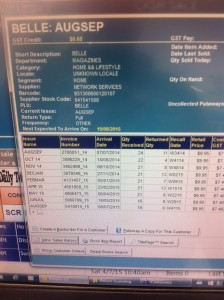 Look at this evidence of Network Services increasing supply some issues back of Belle to a newsagent without any justification in the sales data. Network is owned by Bauer. Bauer representatives told the ACCC recently that they want to support newsagents and help them grow their businesses. The actions from Bauer indicate something different. No wonder newsagents early return.
Look at this evidence of Network Services increasing supply some issues back of Belle to a newsagent without any justification in the sales data. Network is owned by Bauer. Bauer representatives told the ACCC recently that they want to support newsagents and help them grow their businesses. The actions from Bauer indicate something different. No wonder newsagents early return.